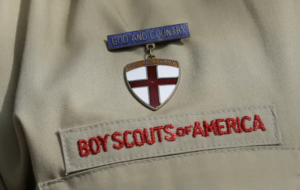Working with clients from coast to coast, Allen & Allen has filed more than 100 bankruptcy claims, arising from sexual abuse, against the Boy Scouts of America.
The alleged sexual abuse ranges from inappropriate grabbing to rape. Scout leaders as well as den mothers and fellow scouts have been implicated.

Photo credit: The Salt Lake Tribune
The Allen & Allen team spent months interviewing survivors, tracking down abusers, and finding witnesses and supporting documentation. They pulled criminal records, newspaper articles, historical records, and obituaries, to substantiate the claims. They studied maps and building layouts and, in many cases, drilled down on the exact locations where the abuse allegedly occurred. In some cases, they obtained medical records to prove that the survivors had received medical treatment and/or therapy because of the abuse. Decades after they were molested, many still suffer from physical and psychological conditions including PTSD, anxiety and depression.
The Boy Scouts of America was chartered in 1910, and has a legacy of abuse. Documents released during litigation demonstrate that although the Boy Scouts were aware of sexual predators within the organization, it did not take the necessary steps to shield children from abuse or conduct background investigations of prospective troop leaders until the 1980s. As a result, sexual predators were able to remain within the organization for many years. Some predators continued to have access to children because Boy Scouts’ leadership feared implicating community leaders that were involved in the organization. Others simply moved from state to state, and from troop to troop, whenever they were discovered.
The number of sexual abuse cases against the Boy Scouts has risen sharply in recent years, forcing the Boy Scouts to file for bankruptcy protection in February 2020. One reason is that in the past five years, some states enacted legislation in order to better protect the survivors of sexual assault. Headlines about sex trafficking, the Catholic church and Jeffrey Epstein have brought renewed attention to the sexual abuse and exploitation of children.

As a general rule, when children are injured, the law allows them to file a personal injury claim until their 20th or 21st birthday. The deadline for a child to file a personal injury claim varies from state to state. However, it is typically two or three years from the date that the child turns 18 years old.
Lately, there has been increased awareness that two or three years is not enough time in molestation cases, particularly where the child did not understand that they were being sexually molested, or where the child suppressed or blocked memories of the abuse. In recognition of this fact, some states extended their statute of limitations in order to allow individuals who were abused as children to have additional time to file lawsuits arising from the abuse.
Although extending the statute of limitations is a welcome legislative change, it does not help children whose sexual assault claims expired before the statute was enacted. Therefore, some states – like California and New York – opened a “revival window.” These revival windows allow sexual abuse survivors to file expired claims for a limited time. They are the reason that hundreds of sexual abuse survivors were finally able to file claims against the Boy Scouts seeking redress for their injuries, and are a driving force behind the Boy Scouts’ decision to file for bankruptcy protection in Delaware.
In early bankruptcy filings, the Boy Scouts of America predicted that about 7,000 sexual assault claims would be filed against them. Instead, almost 92,000 claimants came forward.
The Boy Scouts is establishing a trust in order to compensate the survivors. Once established, trust administrators will review and evaluate the 92,000 claims and make decisions about compensation.




